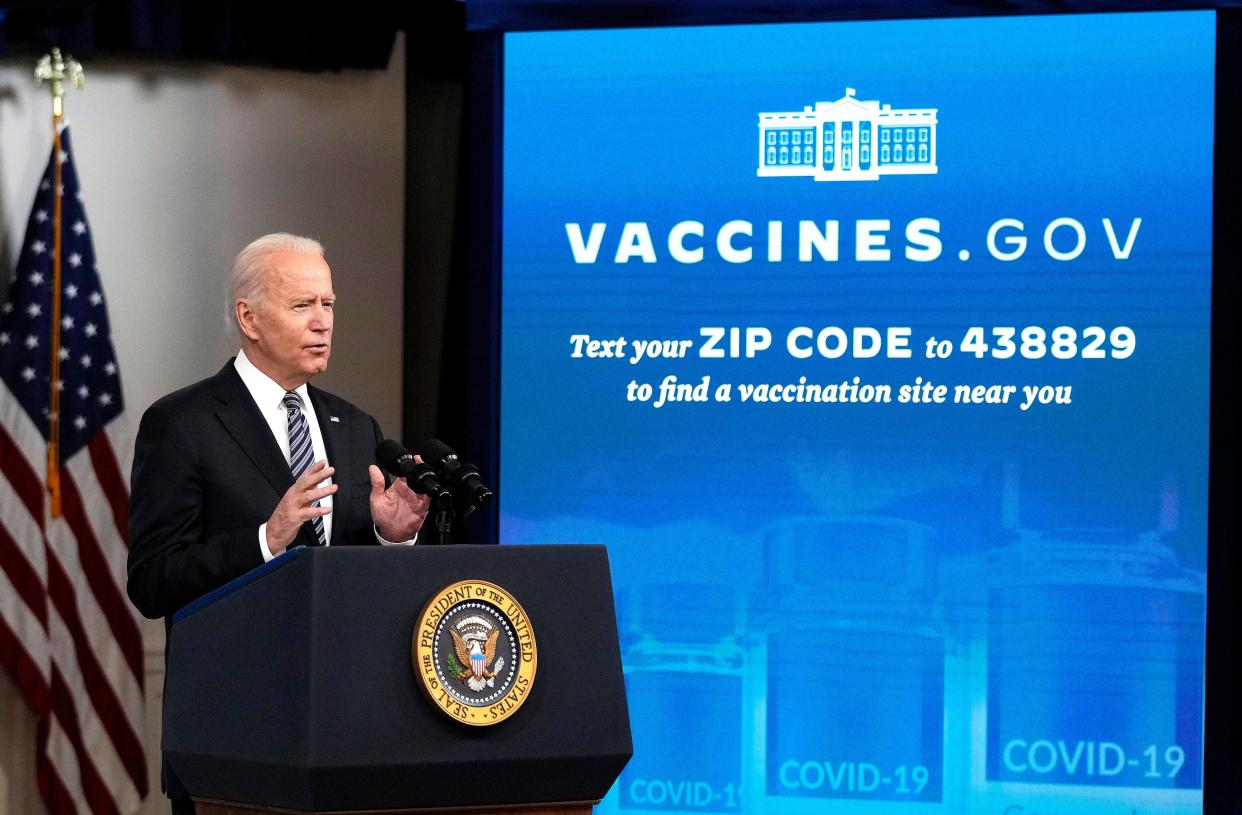4 reasons you shouldn't assume Democrats are doomed in the 2022 midterm elections

- Oops!Something went wrong.Please try again later.
Remember the last time Democrats had a new president in the Oval Office? In May 2009, Lady Gaga’s “Poker Face” topped the charts. The iPhone was 2 years old. The first "Star Trek" remake led at the box office. And Democrats controlled Congress, but that was short-lived. Just 18 months later, the party lost its House majority in a midterm election shellacking.
Some people insist that we’re preordained to repeat that fate in the 2022 midterms.
But a lot has changed in the past 12 years. As a country, we’ve become more diverse and more divided, more technological and more terrified. We’ve beaten back the Tea Party movement, defeated Donald Trump, and we’re on the way to overcoming a once-in-a-century pandemic.
There’s no doubt that the trend of first-term presidential midterms isn’t encouraging. But that doesn’t mean we have to assume the same story will play out in 2022 – any more than we should assume that the future will look like what "Star Trek" has been depicting since the 1960s.
Among the many reasons why the past isn’t prologue, here are four key ones that show why history might not repeat itself.
Democrats expected 2010 losses
First, and most important, many of the congressional races we lost in 2010 were districts that Democrats were just renting. Out of the 257 seats in the House Democratic majority going into the 2010 midterms, nearly 20% (49 seats) were in districts that Republican nominee John McCain had won in 2008. We’re talking about places like Alabama 2, where McCain beat Obama by 27 points; Arkansas 4, where McCain won by 19 points; and Texas 17, where the margin was 35 points.
The 2008 election saw a historic Democratic majority that accomplished tremendous things for the country, but it wasn’t built on stable footing or secure districts. By contrast, our current majority is more securely held: Only 3% of the 222-seat Democratic majority (seven seats) are in districts that Trump won in 2020. While that may change slightly in redistricting, our majority is built on a lot less rented terrain.

Second, midterm elections are often a referendum on the party in power – and people are pretty satisfied with the Biden administration so far. The pollsters at Data for Progress have found support for the American Rescue Plan at 69%; the team at Navigator Research reported support at 65%. The American Rescue Plan is so well-liked that Republicans who voted against it have been caught trying to claim credit for it.
Even the GOP's own polling shows that the American Rescue Plan is more popular than former President Trump, according to The Washington Post. By contrast, public support for the Affordable Care Act was only at 41% a few weeks after it became law, according to the Kaiser Family Foundation.

Third, for many voters, this election represents a choice between two parties, two identities and two brands. Republicans were already viewed as the party responsible for failing to contain the problem of COVID-19; now they’re seen as the opposition to the solution.
Let's get real: Joe Biden, Democrats and America need results much more than unity.
Republicans continue to fail working people and the middle class while they embrace insurrectionists and prioritize loyalty to an ousted president. The latest Morning Consult/Politico poll shows that Democrats in Congress are up 2 points in favorability (46% to 44%) while Republicans in Congress are minus 19 (36% to 55%). The NBC News/Wall Street Journal poll and other polls have found similar results.
Finally, this election comes on the heels of a once-in-a-lifetime trauma – one that has been felt in every corner of this country, in every household and every community. Americans are still grappling with the tumult and tragedy of the past year, from lives lost to families kept apart, from jobs lost to bills left unpaid.
COVID fears are a GOP challenge
This wasn’t just a distant event that people felt by watching on TV. Every family felt the pain of the pandemic. And people have decided whom they trust to combat COVID-19: Joe Biden and the Democrats have a 21-point lead over the Republicans (54% to 33%). That is not, however, a signal to feel confident.

After September 11, 2001, people across the country were afraid. That fear kept the Republican majority in power in Congress despite historical trends. While the COVID-19 pandemic has left different scars on families than the 9/11 attacks did, the wounds run as deep, if not deeper – deep enough to drive another history-defying midterm where voters don’t trust the party out of power to keep them safe from the threat.
Right direction: De-Trumpifying America will take longer than 100 days, but Biden's off to a good start
No one should be Pollyannish. Democrats face real challenges going into the midterms. Our fights for working people are putting us up against three of the most well-heeled financial interests in all of politics: Big Oil protecting its subsidies, Big Pharma protecting its profits and Big Business protecting its tax breaks. History might indeed repeat itself. These midterms could spell a defeat for Democrats and the Biden administration.
But history is only certain to repeat itself when we refuse to learn from the past.
As Doc Brown said at the end of "Back to the Future Part III," “Your future hasn’t been written yet. No one’s has. Your future is whatever you make it – so make it a good one.”
Jesse Ferguson (@JesseFFerguson), a veteran Democratic strategist and general consultant, has been involved in every midterm election since 2006. He is a former official for Hillary Clinton’s 2016 presidential campaign and former director of independent expenditures for the Democratic Congressional Campaign Committee.
You can read diverse opinions from our Board of Contributors and other writers on the Opinion front page, on Twitter @usatodayopinion and in our daily Opinion newsletter. To respond to a column, submit a comment to letters@usatoday.com.
This article originally appeared on USA TODAY: 2022 midterms: Republicans may dominate but don't count Democrats out

